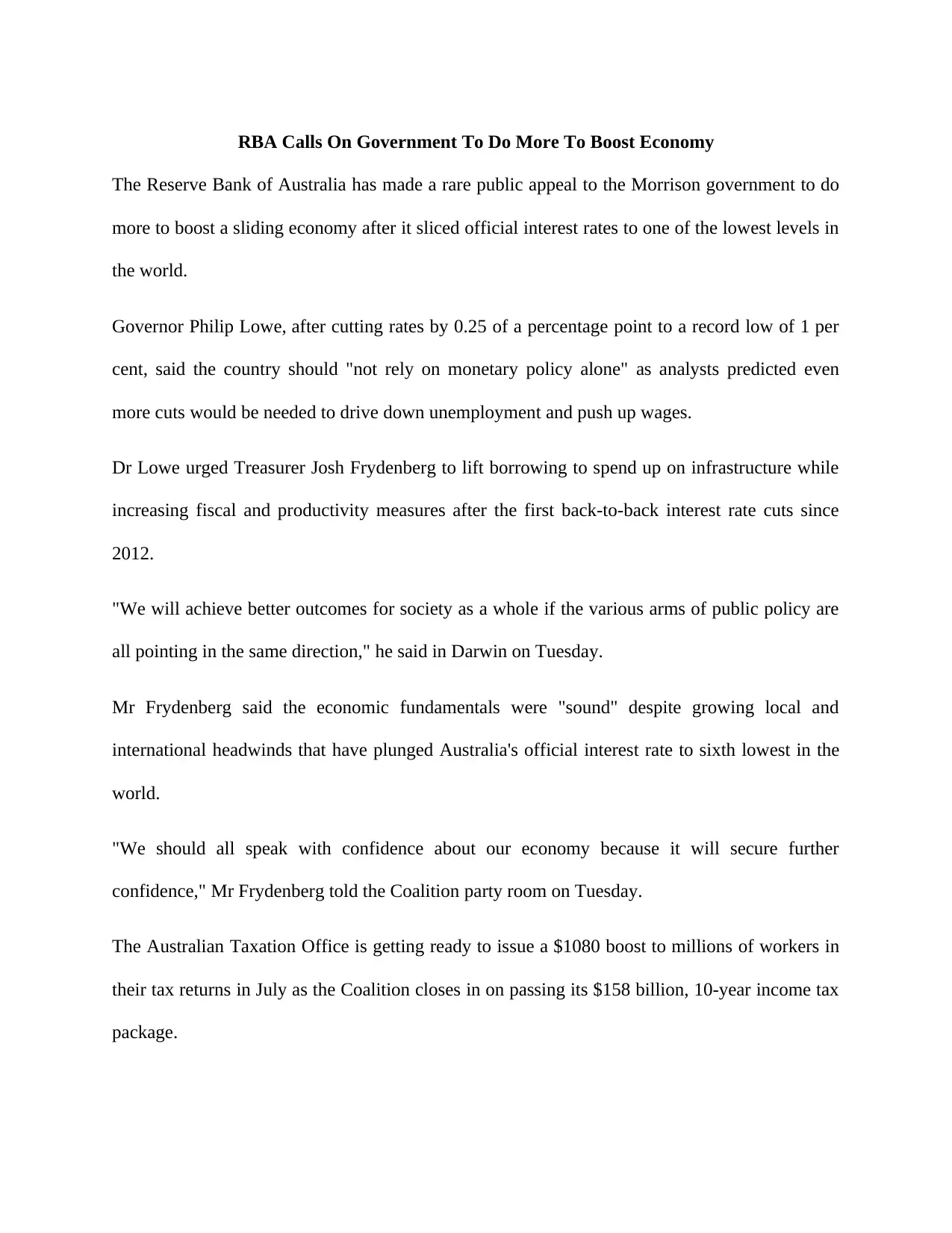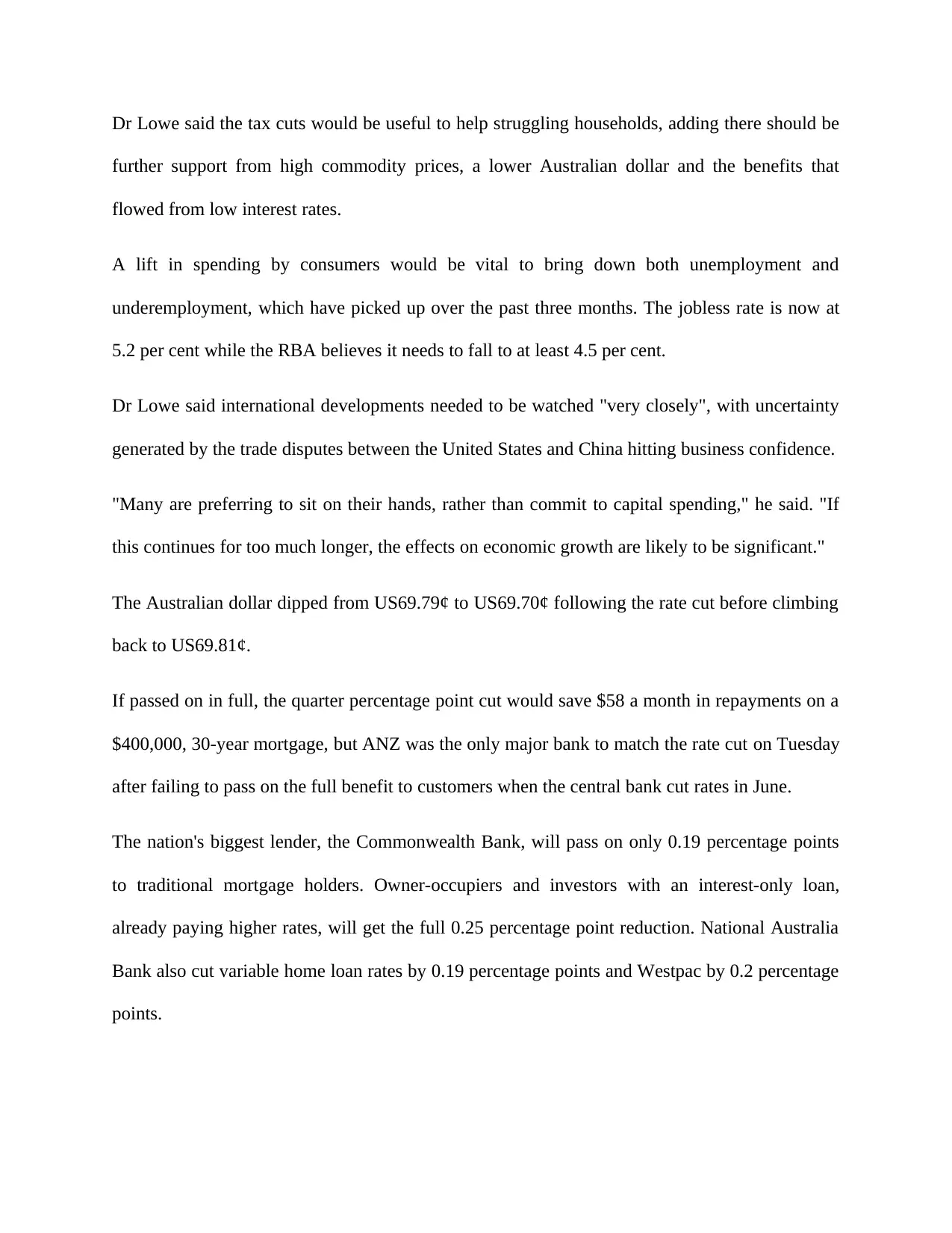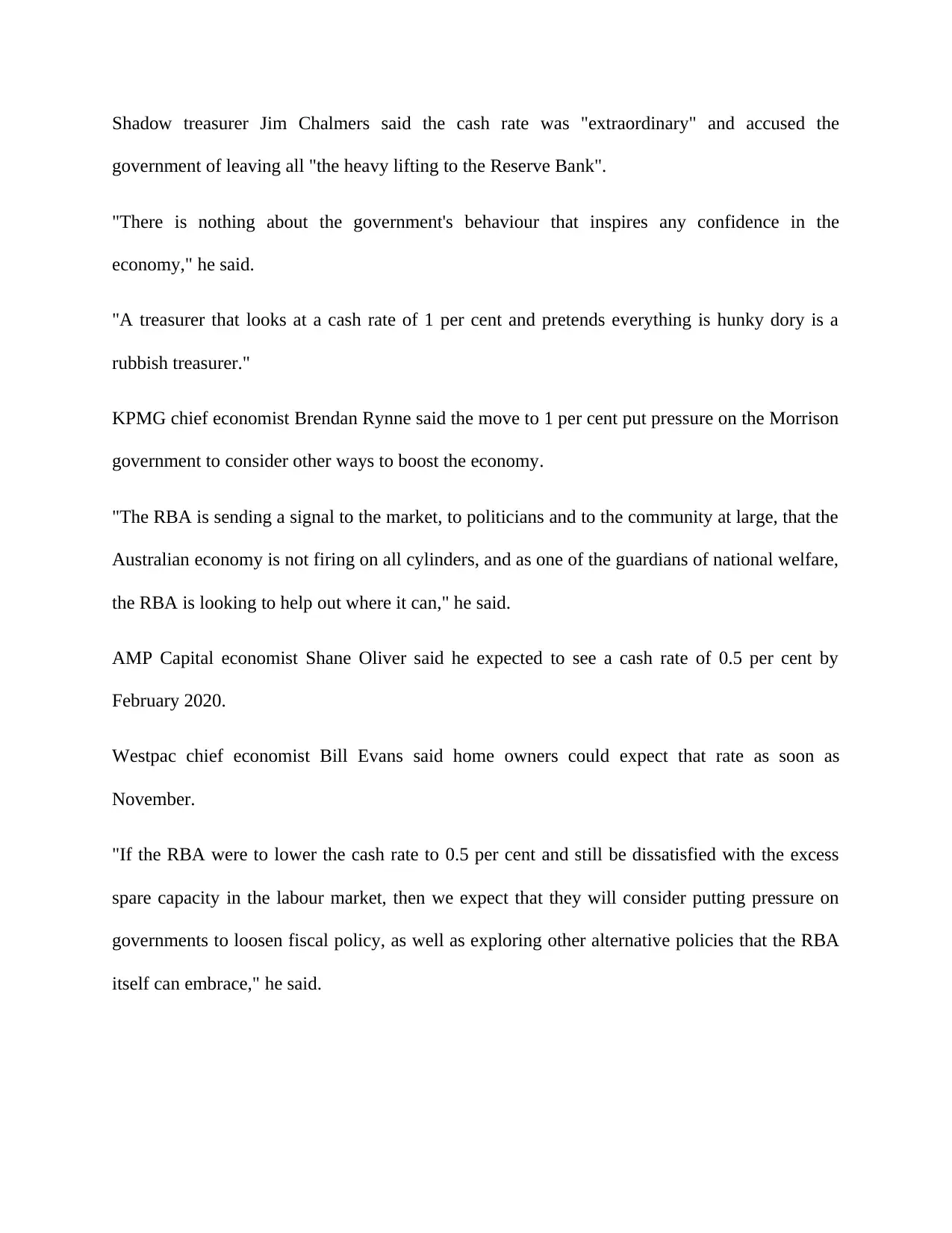RBA Calls On Government To Do More To Boost Economy
VerifiedAdded on 2022/09/18
|3
|827
|19
Assignment
AI Summary
Contribute Materials
Your contribution can guide someone’s learning journey. Share your
documents today.

RBA Calls On Government To Do More To Boost Economy
The Reserve Bank of Australia has made a rare public appeal to the Morrison government to do
more to boost a sliding economy after it sliced official interest rates to one of the lowest levels in
the world.
Governor Philip Lowe, after cutting rates by 0.25 of a percentage point to a record low of 1 per
cent, said the country should "not rely on monetary policy alone" as analysts predicted even
more cuts would be needed to drive down unemployment and push up wages.
Dr Lowe urged Treasurer Josh Frydenberg to lift borrowing to spend up on infrastructure while
increasing fiscal and productivity measures after the first back-to-back interest rate cuts since
2012.
"We will achieve better outcomes for society as a whole if the various arms of public policy are
all pointing in the same direction," he said in Darwin on Tuesday.
Mr Frydenberg said the economic fundamentals were "sound" despite growing local and
international headwinds that have plunged Australia's official interest rate to sixth lowest in the
world.
"We should all speak with confidence about our economy because it will secure further
confidence," Mr Frydenberg told the Coalition party room on Tuesday.
The Australian Taxation Office is getting ready to issue a $1080 boost to millions of workers in
their tax returns in July as the Coalition closes in on passing its $158 billion, 10-year income tax
package.
The Reserve Bank of Australia has made a rare public appeal to the Morrison government to do
more to boost a sliding economy after it sliced official interest rates to one of the lowest levels in
the world.
Governor Philip Lowe, after cutting rates by 0.25 of a percentage point to a record low of 1 per
cent, said the country should "not rely on monetary policy alone" as analysts predicted even
more cuts would be needed to drive down unemployment and push up wages.
Dr Lowe urged Treasurer Josh Frydenberg to lift borrowing to spend up on infrastructure while
increasing fiscal and productivity measures after the first back-to-back interest rate cuts since
2012.
"We will achieve better outcomes for society as a whole if the various arms of public policy are
all pointing in the same direction," he said in Darwin on Tuesday.
Mr Frydenberg said the economic fundamentals were "sound" despite growing local and
international headwinds that have plunged Australia's official interest rate to sixth lowest in the
world.
"We should all speak with confidence about our economy because it will secure further
confidence," Mr Frydenberg told the Coalition party room on Tuesday.
The Australian Taxation Office is getting ready to issue a $1080 boost to millions of workers in
their tax returns in July as the Coalition closes in on passing its $158 billion, 10-year income tax
package.
Secure Best Marks with AI Grader
Need help grading? Try our AI Grader for instant feedback on your assignments.

Dr Lowe said the tax cuts would be useful to help struggling households, adding there should be
further support from high commodity prices, a lower Australian dollar and the benefits that
flowed from low interest rates.
A lift in spending by consumers would be vital to bring down both unemployment and
underemployment, which have picked up over the past three months. The jobless rate is now at
5.2 per cent while the RBA believes it needs to fall to at least 4.5 per cent.
Dr Lowe said international developments needed to be watched "very closely", with uncertainty
generated by the trade disputes between the United States and China hitting business confidence.
"Many are preferring to sit on their hands, rather than commit to capital spending," he said. "If
this continues for too much longer, the effects on economic growth are likely to be significant."
The Australian dollar dipped from US69.79¢ to US69.70¢ following the rate cut before climbing
back to US69.81¢.
If passed on in full, the quarter percentage point cut would save $58 a month in repayments on a
$400,000, 30-year mortgage, but ANZ was the only major bank to match the rate cut on Tuesday
after failing to pass on the full benefit to customers when the central bank cut rates in June.
The nation's biggest lender, the Commonwealth Bank, will pass on only 0.19 percentage points
to traditional mortgage holders. Owner-occupiers and investors with an interest-only loan,
already paying higher rates, will get the full 0.25 percentage point reduction. National Australia
Bank also cut variable home loan rates by 0.19 percentage points and Westpac by 0.2 percentage
points.
further support from high commodity prices, a lower Australian dollar and the benefits that
flowed from low interest rates.
A lift in spending by consumers would be vital to bring down both unemployment and
underemployment, which have picked up over the past three months. The jobless rate is now at
5.2 per cent while the RBA believes it needs to fall to at least 4.5 per cent.
Dr Lowe said international developments needed to be watched "very closely", with uncertainty
generated by the trade disputes between the United States and China hitting business confidence.
"Many are preferring to sit on their hands, rather than commit to capital spending," he said. "If
this continues for too much longer, the effects on economic growth are likely to be significant."
The Australian dollar dipped from US69.79¢ to US69.70¢ following the rate cut before climbing
back to US69.81¢.
If passed on in full, the quarter percentage point cut would save $58 a month in repayments on a
$400,000, 30-year mortgage, but ANZ was the only major bank to match the rate cut on Tuesday
after failing to pass on the full benefit to customers when the central bank cut rates in June.
The nation's biggest lender, the Commonwealth Bank, will pass on only 0.19 percentage points
to traditional mortgage holders. Owner-occupiers and investors with an interest-only loan,
already paying higher rates, will get the full 0.25 percentage point reduction. National Australia
Bank also cut variable home loan rates by 0.19 percentage points and Westpac by 0.2 percentage
points.

Shadow treasurer Jim Chalmers said the cash rate was "extraordinary" and accused the
government of leaving all "the heavy lifting to the Reserve Bank".
"There is nothing about the government's behaviour that inspires any confidence in the
economy," he said.
"A treasurer that looks at a cash rate of 1 per cent and pretends everything is hunky dory is a
rubbish treasurer."
KPMG chief economist Brendan Rynne said the move to 1 per cent put pressure on the Morrison
government to consider other ways to boost the economy.
"The RBA is sending a signal to the market, to politicians and to the community at large, that the
Australian economy is not firing on all cylinders, and as one of the guardians of national welfare,
the RBA is looking to help out where it can," he said.
AMP Capital economist Shane Oliver said he expected to see a cash rate of 0.5 per cent by
February 2020.
Westpac chief economist Bill Evans said home owners could expect that rate as soon as
November.
"If the RBA were to lower the cash rate to 0.5 per cent and still be dissatisfied with the excess
spare capacity in the labour market, then we expect that they will consider putting pressure on
governments to loosen fiscal policy, as well as exploring other alternative policies that the RBA
itself can embrace," he said.
government of leaving all "the heavy lifting to the Reserve Bank".
"There is nothing about the government's behaviour that inspires any confidence in the
economy," he said.
"A treasurer that looks at a cash rate of 1 per cent and pretends everything is hunky dory is a
rubbish treasurer."
KPMG chief economist Brendan Rynne said the move to 1 per cent put pressure on the Morrison
government to consider other ways to boost the economy.
"The RBA is sending a signal to the market, to politicians and to the community at large, that the
Australian economy is not firing on all cylinders, and as one of the guardians of national welfare,
the RBA is looking to help out where it can," he said.
AMP Capital economist Shane Oliver said he expected to see a cash rate of 0.5 per cent by
February 2020.
Westpac chief economist Bill Evans said home owners could expect that rate as soon as
November.
"If the RBA were to lower the cash rate to 0.5 per cent and still be dissatisfied with the excess
spare capacity in the labour market, then we expect that they will consider putting pressure on
governments to loosen fiscal policy, as well as exploring other alternative policies that the RBA
itself can embrace," he said.
1 out of 3
Your All-in-One AI-Powered Toolkit for Academic Success.
+13062052269
info@desklib.com
Available 24*7 on WhatsApp / Email
![[object Object]](/_next/static/media/star-bottom.7253800d.svg)
Unlock your academic potential
© 2024 | Zucol Services PVT LTD | All rights reserved.



